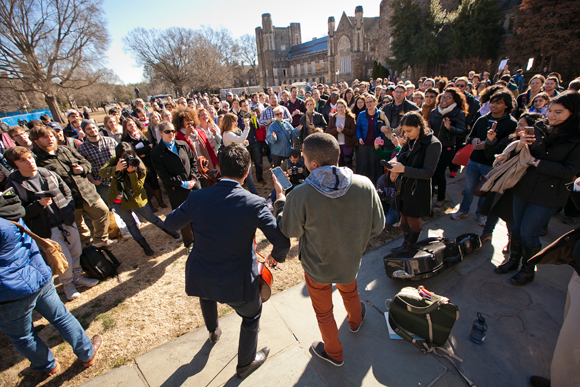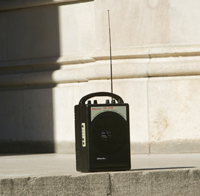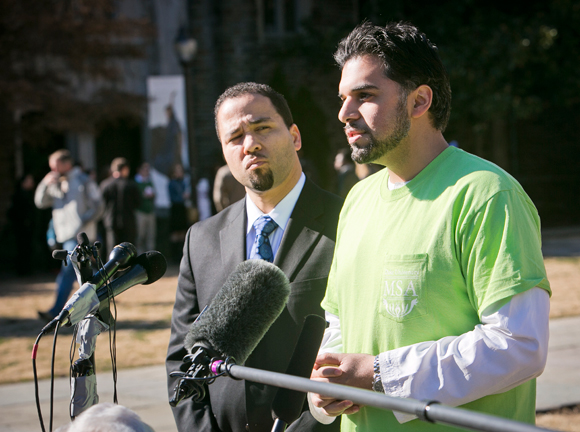Hundreds Attend First Public Adhan Outside Chapel
After controversy, Duke community shows up to express support

Students Richard Phillips and Matthew Bunyi lead the audience in "Stand By Me" prior to the adhan. Photo by Megan Morr/Duke University Photography
After a week of controversy, the first Duke University Muslim public call-to-prayer was held Friday with several hundred supporters on hand to reaffirm the place Muslims and all religious faiths have on campus.
The call-to-prayer, known as adhan, took place in front of Duke Chapel, a change from the initial announcement that it would be delivered from the chapel tower.
The event attracted Duke faculty, staff and students as well as local community members of all faiths. Before the adhan, sophomore Richard Phillips and student cellist Matthew Bunyi led the crowd in singing "Stand By Me," while others held signs declaring their support with campus Muslims.
Despite several calls on social media to disrupt the service, there were no observable protests.
"The message is Duke is continuing to warmly embrace the campus Muslim community and expressions of different religious faith," the Rev. Luke Powery, dean of Duke Chapel, told reporters prior to the adhan. "We will continue to show a generous hospitality on campus."
The adhan was sung in English and Arabic by a member of the Muslim Student Association using a hand-held microphone behind a chapel door. A small speaker on the chapel steps broadcast the adhan.
Following the adhan, more than 70 people entered Duke Chapel for the traditional jummah prayer service, held in the chapel basement. Several hundred members of the 15,000 Duke student body identify themselves as Muslims.
Imam Adeel Zeb, the campus Muslim chaplain and director of the Center for Muslim Life, said Duke Muslim students were disappointed that the initial decision to hold the adhan in the tower was changed, disappointment that was tempered with pride by the prominent role they do play on campus.
"I share the students' disappointment," Zeb told reporters in front of the chapel prior to the service. "At the same time, we can also be proud that Duke has presented the campus Muslim community with a Muslim life that is far more comprehensive than at many other universities in the United States."
Duke has been a leader in promoting Muslim life in university education and was one of the first research universities to appoint a Muslim student chaplain in 2008. The Center for Muslim Life was formed a year later. Jummah prayer services have been held on campus for many years, first in a Divinity School room and more recently in the Duke Chapel basement.
Powery said the adhan decision came after several months of discussion among campus religious life leaders as a means of continuing Duke's long-standing commitment to the Muslim community and ecumenical openness.
"With the initial decision, we hoped to galvanize campus unity, but unfortunately it did not have the intended effect," Powery said.

He added the controversy underscores the important role Duke Chapel plays at the university as a symbol as well as the tension inherent in the multiple uses of the building, a role many not familiar with the Duke campus may not understand.
"We are a Christian church with a vibrant community seen through many outlets -- from radio to YouTube," Powery said.
"We are also a moderator of a variety of campus religious life groups, bringing together students from different faiths. And we are a university building that holds many events, both religious and non-religious, to support the university community."
Criticism of the initial decision came from several sources -- including from people and groups with little or no connection to the university -- and carried a high level of vitriol. Duke officials said one reason for the change of policy was that they received "serious and credible concerns about safety and security," said Mike Schoenfeld, Duke’s vice president for public affairs and government relations.
But Duke leaders also received thoughtful concerns from within the campus community that pushed administrators to find a compromise solution.
"It's a reminder that when we are talking about changes in Duke Chapel, which transcends all boundaries on campus and is a very important symbol for the university, we have to be deliberate and careful and listen to all of our constituencies," Schoenfeld said. "We didn't do enough of that in this case, but we are going to do so in the future."
The effort also attracted considerable international media attention. Numerous reporters attended the adhan, including US TV networks, the New York Times and international media. Faculty, students and alumni aslo were among those commenting about the issue, as illustrated here, here and here.
Powery and Zeb said the students will be back again for another adhan next Friday. They hope the effort will launch a further discussion about supporting religious pluralism at the chapel and on campus. Powery noted that the controversy occurred on the eve of the university’s annual Martin Luther King Jr. commemoration.
"I'm reminded of his words that hate can't drive out hate, only love can drive out hate," Powery said. "We want this discussion to be about what does it mean to be part of the beloved community."
Zeb said the Muslim students were eager to be part of that discussion. "My job is to teach the Muslim students how to show love to all of faiths here on campus. We want to show the world what being a Muslim is all about."
Below: Powery and Zeb talk to reporters before the adhan. Photo by Megan Morr/Duke University Photography
